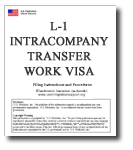 The H-1B visa is well-known in technology circles: U.S. employers use it to hire temporary foreign workers in “specialty occupations.”
The H-1B visa is well-known in technology circles: U.S. employers use it to hire temporary foreign workers in “specialty occupations.”
Engineers and Information Technology (IT) workers have long complained that the H-1B program takes jobs away from Americans. While H-1B requires employees to be paid the prevailing wage, some argue that employers actually pay lower salaries to H-1B workers — and that this depresses salaries across the board.
Enter L-1: A dog of a visa?
While there is a cap on the number of H-1B visas issued in the U.S., there is no cap on the L-1 visa, which has no prevailing wage requirement.
 The L-1 visa is used by foreign companies for intra-company transfers of foreign employees into the U.S. L-1 workers are supposed to have “specialized knowledge” — but my dog could claim that his nose enables him to fulfill that requirement.
The L-1 visa is used by foreign companies for intra-company transfers of foreign employees into the U.S. L-1 workers are supposed to have “specialized knowledge” — but my dog could claim that his nose enables him to fulfill that requirement.
Use of the L-1 visa is growing, in part because the definition of “specialized knowledge” makes it easier to abuse.
Leading work to other countries?
Computerworld reports in an article, Charting H-1B users, as attention shifts to L-1, that, according to the Economic Policy Institute (EPI), L-1 could start resulting in significant job losses for Americans. EPI warns of “offshore outsourcing firms whose business model is to first hire L-1 workers to learn the work done by Americans, then to transfer that work overseas.”
Says an EPI analyst: “The L-1 program was not intended to function in this way. Nevertheless, this blatant misuse of the program is legally permissible. As a result, the program is operating at the expense of American workers.”
 The issue: The U.S. government is considering changing the definition of “specialized knowledge,” and EPI is warning that the new definition could cause new, more extensive job losses. Are American jobs being led out of the country on L-1 leashes? I mean, L-1 visas?
The issue: The U.S. government is considering changing the definition of “specialized knowledge,” and EPI is warning that the new definition could cause new, more extensive job losses. Are American jobs being led out of the country on L-1 leashes? I mean, L-1 visas?
Meanwhile, foreign companies that want to transfer more of their employees to work in their U.S. facilities complain about the restrictions.
Have you encountered L-1? Is it the new H-1B?
: :

Related to this topic, Norm Matloff’s, a CS professor who has written and even testified in front of congress about this issue:
http://heather.cs.ucdavis.edu/h1b.html
He’s been warning of these issues for at least 10-15 years.
Like I’ve always commented, there isn’t a shortage of people willing/able to do the work, there’s a shortage of companies looking to properly plan for, hire and develop talent.
My job keeps moving to India, China, and Tennessee. Anywhere where there is cheap programers.
But cheap programmers do a crappy job. The quality is low, the design work has holes in it the size of a truck.
In 30 years they will do fine. How do I know? 30 years ago, I did the same crap I see now. And I was cheaper then too.
In the meantime, companies pay cheap employees to do a crappy job and then hire a senior, knowledgable person to clean up the mess or design it so that the cheaper people can’t muck it up much.
I’d call what I do mentoring, but then I get laid off. And rehired when the cheap people muck it up since I left.
All I know is that I tried to hire the best candidate for a job I had. That candidate would have needed to be on an H1-B visa. Due to issues arising from the difficulty of the visa process, I could not hire this person!!!
I am done listening to the incessant whining about H1-B visas. The person in question here would, IMHO, be an excellent US citizen if they were allowed to be, but we are so damn concerned with a “they took our jobs” mentality that we don’t even want to expand the American citizenry by adding more highly talented people to it.
Quality people doing quality jobs bring value and enhances the economy, period. Whining about H1-B visas is a rear-guard action. As Nick says so often, prove you can do the job in the interview. If you can do that, you should get the job.
If you are the best candidate, I don’t care where you’re from I want you working for me. If you’re a hard working foreign national working for a company and adding value, then I would love to see you become a fellow citizen.
The Statue of Liberty says “Give me your tired, your poor,
Your huddled masses yearning to breathe free.” I think we should also add, “give me your smart and your talented” to that. Why the heck have we decided that we don’t WANT the best and brightest from other countries to come work HERE?????
Our immigration policies are misguided protectionism.
Um, dude, loads of people at Disney, among other places, were canned after ALREADY having the jobs, and were made to train their H1B replacements in order to get their severance package. You aren’t safe from the H1B menace, even WITH the job.
@Jason: I think the H-1B program is both valid and important to American business. If you could find only a foreign national to fill your job, then the H-1B program should make it as easy as possible for you to do it.
But it seems pretty clear that “give me your smart and talented” doesn’t mean, “so we can train and pay them to go back home and compete with us.”
How we invest in people is a matter of public policy. Expecting a return on our investment is as reasonable a desire as your desire to hire the best. Both needs can be served, if it’s done above board.
Please consider that in other nations, an American couldn’t get hired under any circumstances. Employment laws are far more restrictive than they are here, and for a simple reason: They don’t want to deprive their own citizens of jobs.
As long as the rules are reasonable and applied to our national benefit, H-1B is a good thing. When it’s abused, it’s not. I posted this column to encourage discussion.
Adopting foreign talent for the national good is a good policy. I don’t have much sympathy for American workers who can’t compete. But I don’t have any sympathy for foreign (L-1) employers who use the program against our national interest. Congress has an obligation to its citizens first.
@Nick…
“As long as the rules are reasonable and applied to our national benefit, H-1B is a good thing. When it’s abused, it’s not.”
Totally agree with this statement. I think it’s in our national interest to import talent.
The one thing I would point out/ask though is how necessary is the H1B/L1 program in a recession/depression? Unemployment has been hovering between 8-10% the last few years and some guesstimates place it a lot higher depending on what you consider.
To me, I think the H1B program would be a good thing when we’re at full employment. And there has to be other strict rules around it as well as one could argue that it’s also in our best interest to educate and develop our own talent as well. As an example, I’ve heard people complain that they need H1B’s/L1’s and/or need to outsource because they can’t find anyone with N years experience in a laundry list of keywords. They don’t/won’t consider people with <N years or don't have the keywords. I'd rather have someone 80% of what I need, locally, that can start within two weeks.
Nick, good topic and good discussion. I’m with you and Dave. When we’re at or near full employment, then H1-B1 visa program is good. The problem is that there are some unscrupulous employers who abuse it so they can get the cheapest labor possible, which, as you and Bob noted, depresses salaries across the board AND makes a mess of things (leaving it for consultants or temps to clean up).
Here’s a concept: how about employers actually investing in American citizens, you know, TRAINING them to do the jobs instead of hiring foreigners. The employers want purple squirrels, and because no human being is looking at applications, no thought is put into the hiring process. If the company wants the future employee to 5 years experience and someone applies who has 4 years experience and otherwise seems to be a good possible fit, why not hire him or her and train him or her? Years ago, learning on the job was common and expected. Today, it seems that employers expect people to step in and do the job without training and investment. There are lots of good, qualified American citizens who would work if employers weren’t so pig-headed.
@marybeth…
It’s sort of like the old chicken and egg thing…
You can’t have a pool of qualified employees without some sort of additional on the job training.
You can’t complain about not having qualified employees if you’re simply doing strict keyword searches.
I keep reading about the looming student debt crisis. Regardless of whether colleges prepare students for the real world, it’s a not a good thing when the only job many graduates can find is call center and other lower end jobs that don’t pay much.
The L-1a visa is meant to be used for the intra-company transfer of managers into the US. This means departments heads, people with high executive authority. The L-1b visa is a vaguely worded provision for professions with “specialized knowledge” of a business.
Some US companies are contracting with outsourcing body-shops like TCS which bring large numbers of IT workers into the US with L-1 visa sponsorship as low-cost, docile, indentured servants. The L-1 visa holders end up in the clients’ IT departments performing low-level production support and programming. They are also used to transfer work overseas to the outsourcing companies’ facilities in India. By no stretch of the imagination can most of these L-1 visa be called “managers”. Nor do they possess any real specialized knowledge of the business they are supporting.
Contrary to the quote of the EPI analyst, this misuse of the L-1 visa cannot be legally permissible. Sponsoring visa workers into this country under the false pretense that they are managers or possess specialized knowledge represents willful fraud against the US Government. There should be penalties for gaming the visa worker program in this way
Regarding Jason’s comments – If you have an American who is equally talented as your HB-1 visa candidate then who are you going to hire?
If you’re asking American Professional’s to compete with third world country wages, well then we might as well throw in the towel.
And I cannot wait for the day that managers and CIO positions are outsourced just as easily as Jason wants to bring others into this country.
As a country, we are already having difficulty paying our bills and if more jobs are lost…well…you get the picture. Meanwhile, in India their government already has restrictions pertaining to who gets jobs there.
I believe we need to protect American jobs in order to protect our tax base, because without that we will most assuredly become a second class nation – if not already. While a difficult topic, I side with America on this one.
Larry,
The person I wanted to hire was already here, the problems centered around them having to go to the end of the line for a green card due to how our government handles applications from their country.
We offered to pay a wage from our set pay scale, not some “special” rate.
The position stayed open for another 6 months before we found someone.
Sure we had interviewed other American citizens for this job, but they were not talented enough for the position. If your not talented enough for the job you don’t get it, we’re not an employment agency.
I really think that fighting against losing jobs isn’t the right way to solve the problem. We need to create more jobs and get the economy going again.
When the economy was booming, there were immigrants coming into the country in large numbers. Now the economy is bad and there are nowhere near as many immigrants.
Expanding the economy works for everyone. Guarding the diminishing scraps of a contracting economy is a losing game.
Of course figuring out how to get the economy fired up again is not a trivial problem to solve.
Jason, I get your point. The government needs to be ran like a business and because it has never been ran like an efficient and productive business we will continue to have diminishing returns(unless you work for the GSA!). I would prefer the growth option over fighting for scrapes any day. Luckily for me, I made the right career choices and can pick and choose my employer most of time.